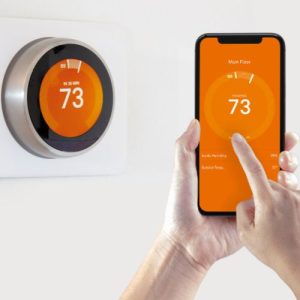10 Revolutionary Applications of AI in Household Settings

From smart assistants to facial recognition, AI-powered devices and services are transforming how we live, making our lives more efficient and convenient. In this article, we explore the top 10 applications of AI in household settings, showcasing the innovations that are shaping the future of home living.
1. Smart Assistants

Smart assistants, such as Siri, Alexa, and Google Assistant, are the most popular AI-powered devices found in our homes.
These voice-activated personal assistants can understand and execute our commands, simplifying tasks like adding items to our shopping list or making a phone call.
As AI technology advances, voice assistants will continue to evolve and become even more capable of assisting us in our daily lives.
Voice-Controlled Home Devices
Smart assistants can also be integrated with other home devices such as lights, thermostats, and speakers. By connecting these devices to your smart assistant, you can control your home environment using voice commands.
This not only adds a layer of convenience to your life but also allows you to interact with your home in a more intuitive and natural way.
2. AI-Enhanced Security Systems
AI technology has revolutionized home security in numerous ways, with smart cameras and locks leading the charge.
AI-Powered Security Cameras

AI-powered security cameras come equipped with facial recognition, making it easier for homeowners to identify intruders, monitor when parcels arrive, and keep track of family members.
These cameras provide an extra layer of security and convenience, as they can distinguish between familiar and unfamiliar faces, ensuring that your home remains safe and secure.
Smart Locks
Smart locks use AI technology to connect to your smartphone, allowing you to control access to your home remotely.
With features like tamper detection, granting or revoking access to digital keys, and tracking entry and exit times, smart locks provide a superior level of security compared to traditional locks.
3. AI-Driven Home Appliances
AI technology has also found its way into everyday home appliances, making them more efficient and user-friendly.
AI Televisions

AI-powered televisions can replace the need for remote control by incorporating voice assistant technology.
This allows users to control their TV using voice commands, eliminating the need to search for a lost remote and streamlining the viewing experience.
Robot Vacuum Cleaners
Robot vacuum cleaners use AI technology to navigate and clean your home autonomously.
These devices can be programmed to follow specific cleaning tasks and routes, requiring little to no human intervention. Some models are even capable of emptying themselves, further reducing the time and effort spent on household chores.
4. Smart Kitchen Appliances
From coffee machines to ovens and smart fridges, these devices are learning our schedules and patterns to provide us with timely meals, beverages, and personalized cooking experiences.
AI Cooking

AI-enabled kitchen appliances can help you create food and beverages at specific times, making meal planning and preparation more efficient.
Some smart fridges can even determine whether food is safe to consume and suggest recipes based on available ingredients.
Robotic cooking assistants are also available to help with meal preparation, especially for people with disabilities.
5. Health and Fitness Monitoring
AI technology is transforming the way we monitor and manage our health at home. AI-powered devices can collect real-time data and relay it to healthcare professionals, enabling them to remotely monitor patients and assess their risk of injury or disease.
Fitness Mirrors
AI-enabled fitness mirrors can track users’ health and exercise routines in real-time, providing personalized feedback and suggestions.
This technology not only helps to improve fitness levels but can also reduce the burden on healthcare systems by allowing doctors to monitor patients more closely.
6. Smart Energy Management

AI-driven energy management systems are helping homeowners analyze and optimize their energy and gas consumption.
These systems can reduce wasted energy, save money, and contribute to a more sustainable environment.
Smart Thermostats and Meters
Smart thermostats and meters use AI technology to monitor and adjust energy consumption in real-time.
Some of these devices can even determine the best location for solar panels, enabling homeowners to make the most of renewable energy sources.
7. Home Automation and Maintenance
AI technology is streamlining home maintenance and making it easier to manage home projects.
Home Diagnostics and Repair

AI-powered home systems can run self-diagnostics to predict potential issues before they occur, contacting the appropriate repair service to resolve the problem.
This proactive approach can save homeowners time and money while ensuring that their homes remain in optimal condition.
Interconnected Home Ecosystem
AI technology is also facilitating the creation of interconnected home ecosystems, where devices communicate and work together to improve the overall quality of life.
With the integration of 5G technology and the Internet of Things (IoT), homes will soon be part of a complex web of data and communication that can be analyzed using AI to optimize energy consumption, traffic, and overcrowding in smart cities.
8. Facial Recognition Technology

Facial recognition technology is a prominent application of AI in our daily lives, found in various smartphone apps and social media platforms.
Social Media and Photo Applications
Apps like Snapchat, Facebook, and LucidPix use AI-driven facial recognition to detect users’ faces and apply various features such as face filters, photo tagging, and 3D photo conversion.
This technology has not only made our digital interactions more engaging and personalized but also showcases the potential of AI in enhancing our social experiences.
9. Media Recommendations

AI technology has significantly improved the way we discover and consume digital media.
AI-Powered Content Recommendations
Platforms like Netflix and YouTube use AI algorithms to analyze user behavior and preferences, suggesting relevant content based on this data.
This personalized approach to content discovery ensures that users are presented with engaging and relevant media, enhancing their overall viewing experience.
10. AI in Online Banking
AI technology has also penetrated the realm of online banking, making it easier and more secure for users to manage their finances from the comfort of their homes.
Mobile Check Deposits

Many banks now offer mobile check deposit services that utilize AI-powered handwriting recognition. This enables users to deposit checks digitally, without the need to visit a physical branch. This convenient feature is especially useful during times of restricted movement, such as the recent pandemic.
In conclusion, AI technology has made significant strides in the realm of household applications, transforming various aspects of our daily lives.
From smart assistants to energy management, AI-powered devices and services are revolutionizing the way we live, work, and interact with our homes. As AI technology continues to advance, we can expect even more innovative and groundbreaking developments in the near future.

Related Artificial Intelligence
100 Applications of AI and Machine Learning
AI Programming for Beginners: A Step-by-Step Guide to Get You Started
The Ultimate Data Science vs Machine Learning Guide
From Sci-Fi to Reality: Exploring the Evolution of Artificial Intelligence
How To Become An Artificial Intelligence Engineer
Top AI Data Analytics Tools You Can’t Miss in 2024
10 Free Face Recognition Software
5 Steps To Becoming A Machine Learning Engineer